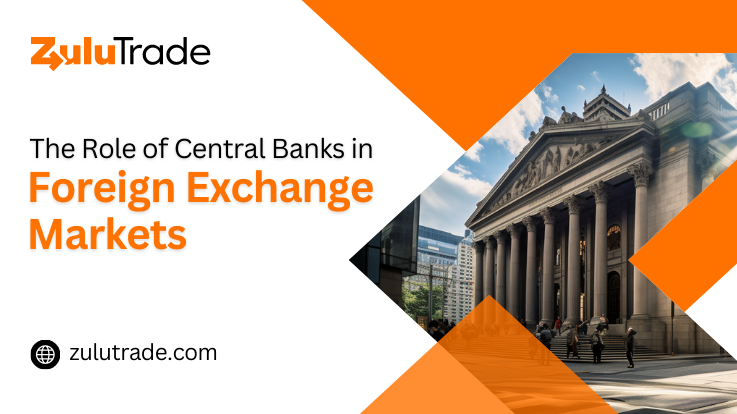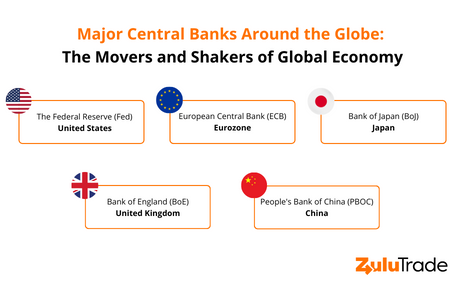
The world of finance and economics often seems like a maze of complex terms and principles. You’re eager to understand how this intricate system functions, particularly the role of central banks in Forex – the vibrant, global marketplace where currencies are bought and sold. Well, you’ve come to the right place. We’re here to simplify these concepts, answer your burning questions, and guide you through the fascinating landscape of central banking and foreign exchange markets.
Ever wondered about the jobs of central banks, their impact on our daily lives, and why they matter so much in the world economy? Want to know how they help steer the course of national economies and maintain financial stability? You’re about to find out.
We assure you, by the end of this journey, you’ll have a solid grasp on the role of central banks, especially their crucial function in the Forex market. So, fasten your seat belts and let’s dive into the world of central banking. Stick with us, it’s going to be an enlightening ride!
Understanding Central Banks: The Backbone of an Economy
A central bank is like the economic captain of a country. It sets the direction for the nation’s monetary policy, controls money supply, and tries to maintain the financial stability of the country. Think of it as the big boss who oversees all other banks in a country, making sure they’re playing by the rules. The Federal Reserve is the central bank in the United States, while the Bank of England serves this role in the United Kingdom, and so on.
The Many Hats Central Banks Wear: Exploring Their Functions
Central banks have quite a few jobs on their plate. They’re responsible for printing and distributing currency, managing the country’s interest rates, and ensuring the financial system is stable and secure. They also hold a country’s reserve of foreign currency, which can come in handy during times of economic ups and downs.
One of the most vital tasks of a central bank is to control inflation. They try to keep prices stable so that when you go shopping, you’re not shocked by the price tags. Central banks often tweak interest rates to keep inflation in check. Lowering interest rates can give the economy a boost, while raising them can slow things down a bit.
Stepping into the Arena: Role of Central Banks in Forex
Now, let’s talk about Forex, the world’s largest financial market where currencies are traded. It’s like a giant global marketplace where dollars, euros, yen, and other currencies are bought and sold every day.
When it comes to foreign exchange, central banks play a key role due to their ability to affect the value of their country’s currency. Changing interest rates by a central bank, for example, might affect the value of a country’s currency on the foreign exchange market. A rise in interest rates, for instance, may make the U.S. dollar more appealing to investors, driving up its value.
Central banks can also directly intervene in the Forex market. For instance, if a country’s currency is falling too fast, the central bank might buy up large amounts of that currency to boost its value. This is a bit like if the captain of a ship saw it was going off course and steered it back on track.
Major Central Banks Around the Globe: The Movers and Shakers of Global Economy

While every country has its own central bank, a few stand out on the global stage because of their significant impact on the world economy. Let’s take a quick tour around the globe and meet these heavyweights.
1. The Federal Reserve (Fed) - United States
The Federal Reserve, often simply called the Fed, is arguably the most influential central bank in the world. Since the U.S. dollar is the world’s main reserve currency, the Fed’s policies often have a far-reaching impact on global financial markets. The Fed uses various tools, such as altering the interest rates and buying or selling government bonds, to manage inflation and stabilize the U.S. economy.
2. European Central Bank (ECB) - Eurozone
The ECB manages monetary policy for the 19 countries that use the euro. It has a unique challenge because it must balance the needs of multiple different economies under one monetary policy. The ECB plays a major role in determining the value of the euro, which is one of the most traded currencies on the Forex market.
3. Bank of Japan (BoJ) - Japan
The BoJ has a critical influence on the third-largest economy in the world. Known for its bold moves, like implementing negative interest rates, the Bank of Japan’s decisions are closely watched by investors around the world. The policies of BoJ directly impact the value of the yen, another significant player in the Forex market.
4. Bank of England (BoE) - United Kingdom
The BoE, the world’s second oldest central bank, sets the interest rates and controls the money supply for one of the world’s leading financial centers. Despite the UK’s relatively small size, the British pound is one of the most traded currencies in the world, making the Bank of England a key player in the Forex market.
5. People's Bank of China (PBOC) - China
The PBOC guides the monetary policy for the world’s second-largest economy. While the Chinese yuan is not as heavily traded as the currencies of other major central banks, the PBOC’s decisions still significantly affect global financial markets because of the sheer size of China’s economy.
These central banks, among others, have a powerful role in shaping global financial trends through their actions in their domestic economies and the Forex market. Their policies and strategies are closely watched by investors, economists, and traders worldwide who understand the critical influence these institutions wield on the global stage.
Wrapping up!
In summary, central banks play a pivotal role not only in the national economy but also in the international Forex market. They navigate the economic ship of a country and help keep the exchange rates stable. Central banks’ actions in the money market and Forex market, whether direct or indirect, can have wide-reaching impacts on everything from the price of your morning coffee to the cost of your dream vacation. So, the next time you come across the term “central bank” in the news, you’ll know just how important it is!
